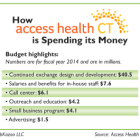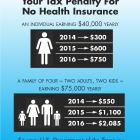Disparities
ACA Court Challenge: What’s At Stake For Connecticut
|
Tens of thousands of Connecticut residents who receive federal subsidies to help pay for health insurance won’t be affected immediately by the latest challenge to the Affordable Care Act before the U.S. Supreme Court. But experts say there’s a good chance Connecticut residents will experience some political fallout from the court decision – which could come as soon as Thursday – challenging the validity of federal premium tax credits to 6.4 million Americans in 34 states with federally operated insurance marketplaces (also known as exchanges). Nearly 74 percent (74,682) of the 101,294 people who purchased commercial health insurance plans through Access Health CT (AHCT) received federal subsidies, as of June 2015. Connecticut is among the 16 states – along with the District of Columbia – that established their own state-based marketplaces through the health law. A court decision that blocks health insurance subsidies in the federally-operated marketplaces could lead to “some crazy maneuvering at the federal level from a legislative perspective that could impact Connecticut” if Congress moves to repeal or significantly modify the law, said James Wadleigh, chief executive officer of AHCT.


